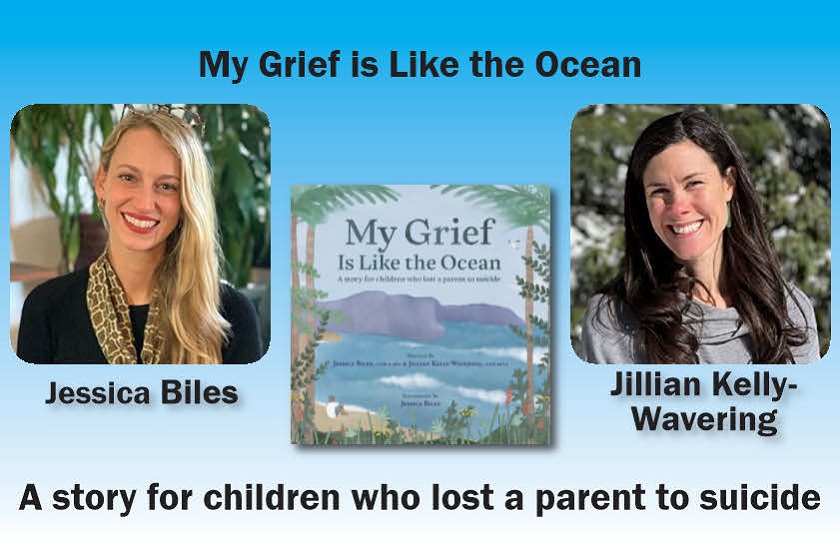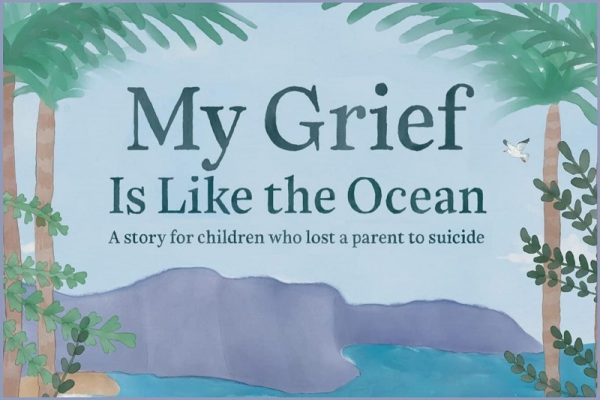Author Interviews
Jessica Biles and Jillian Kelly-Wavering on Grief, Suicide, and Childhood
My Grief is Like the Ocean (Loving Healing Press, 2022) by Jessica Biles and Jillian Kelly-Wavering is a story for children who lost a parent to suicide; but it’s also a book for all families.
It won’t be exaggeration to call My Grief is Like the Ocean a potentially life-saving book for kids who are exposed to overwhelming grief at a young age. It’s a must-read for all families. – Recovering the Self.
Jessica Biles and Jillian Kelly-Wavering tell RTS more about the topic of grief and suicide of a parent in a child’s experience as well as their book that helps affected children and families.
Tell us when and how was the concept for this book conceived?
During the pandemic we both observed a trend in our separate child psychotherapy practices of incoming referrals for grief due to a loved one’s death by suicide. In searching for developmentally appropriate resources, we found a gap, and so we decided to take action ourselves. It was a tender subject, and we held space for each other as colleagues and friends, having both had personal losses due to suicide in our own lives.
In your expertise, is it harmful to hide from a child the fact that a parent committed suicide?
It is harmful to hide the truth from a child. Children are perceptive, clever, and quite brilliant. So often times children will find out the truth accidentally (ex: overhearing family whispers, a phone conversation, social media, Google search) which creates a traumatic experience in which they are alone in that painful and unexpected moment of receiving the truth, and also creates a secondary loss of trust in their caregiver for having not shared the truth with them. Of course we always want to be mindful of the child’s developmental stage and coping abilities at the time of such a hard conversation. We don’t want to overwhelm the child. The words in our book take great care to gently, yet directly, address many of the dynamics and feelings when it comes to losing a loved one to death by suicide.
Have you used or plan to use your book in therapy for kids who are coping with grief due to a parent’s suicide?
Yes, we have. We’ve also received positive feedback from other child therapists in the grief and loss field who have read this book with children and also shared its messages with family members looking for “go-to” language and adaptable scripts for having these conversations with children of all ages.
Is there any risk that a child whose parent died by suicide could also become suicidal because of the parent’s choice?
Based on research from many suicide prevention organizations and mental health research centers, death by suicide is correlated with mental health diseases such as depression, bipolar disorder, substance abuse, etc. Because mental health disease can be genetic, and therefore passed on between generations, it’s vitally important for children of parents who die by suicide to get enrolled in mental health treatment for both healing from the loss, and monitoring their own possible mental health symptoms as they age. It’s also why the language in our book takes great care to differentiate between what grief and sadness is and looks like, and what clinical depression is and looks like. When caregivers choose not to talk about the circumstances leading to suicide, it creates a silence, stigma, and dangerous isolation for children who currently, or one day, may be suffering from the same mental health issues. Prevention is about awareness and empowerment.
The book’s illustrations are remarkable. Were they conceived before or after the story?
As Jillian and I were writing our first few drafts for the book, we took great care to consider what each accompanying illustration would look like. So much of storytelling in children’s books happens in the imagery. We wanted our illustrations to tell the story as well. We started off using darker colors for the ocean, and made a conscious effort to lighten them as the story progressed and our protagonist began to feel better. Before starting on the illustrations we decided we wanted to use symbols of hope and safety (e.g. lighthouse, ring buoy, etc.) throughout the book to signify that there is always help available. We hope it came across in the illustrations!
How did you learn about the Loving Healing Press and decide to publish with them?
As child psychotherapists, we’d used several of the books that authors from Loving Healing Press have published within our day-to-day practice. Loving Healing Press is such an important resource for high quality clinically sound books for children and families. In particular we both enjoyed using the series “Please Explain ____” by the fabulous Dr Laurie Zelinger. As colleagues in the New York Play Therapy Association, we reached out to Laurie and she generously introduced us to Victor.
How helpful it is for kids who lost one or more parents to suicide to share their stories with each other?
It’s vital. Death by suicide creates an isolation caused by shame and stigma. Feeling less alone in their grief, and seen for the wholehearted people they are, is so important to healing. Because the feelings around a parent’s death by suicide are so varied and complex, it’s important for children to be able to express feelings like anger, confusion, self-doubt, and rage that may not be as present in children who have lost a parent to natural causes (ex: cancer, heart disease, etc). There is undoubtedly a complex grief response that needs to be addressed for survivors in this way. We also want to clarify that joining support groups and sharing stories with other children typically best comes after having completed individual psychotherapy. Group sharing, without having processed one’s own personal trauma and grief response, would be overwhelming to a child.
Please share your book website where people may read more about the book and order a copy.





